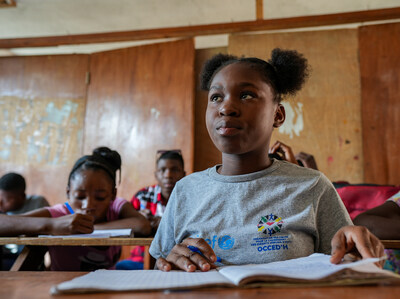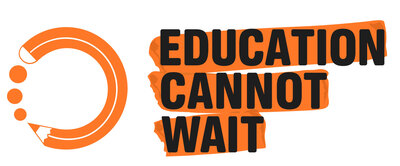Displaced children in Haiti, including Dieussika, are returning to learning through Education Cannot Wait-funded catch-up classes implemented by UNICEF and partners.
PORT-AU-PRINCE, Haiti, Nov. 26, 2025 /PRNewswire/ -- Before the sun rises over Port-au-Prince, a city crippled by ongoing violence and a deepening humanitarian crisis, 14-year-old Dieussika begins her day.

"I'm getting ready for school. It rained heavily last night. It rained so much that my books, my bag, my clothes - almost everything is soaked," says the teen.
Due to the heavy rainfall, Dieussika didn't get much sleep. "I spent the whole night scooping out the water and throwing it outside," she says.
The place Dieussika calls home today is not a home at all. It is a classroom in a former school building, now transformed into a displacement site in the heart of Haiti. She lives there with her family, crammed into a space meant for learning, not shelter.
With funding from Education Cannot Wait (ECW) - the global fund for education in emergencies and protracted crises in the United Nations - UNICEF and partners on the ground are working to ensure that girls and boys affected by the escalating violence and displacement in the country are able to continue their education. Through the ongoing initiative, Dieussika and thousands of other children are being given a second chance to learn in safety.
Restoring Hope Through Education
Dieussika is one of ten children. She, her mother and siblings were forced to leave their home due to the violence that has swept across the capital and beyond.
Today, her family lives in a displaced persons site. While they've lived within the walls of the former-school for over a year, there was a time when the 14-year-old couldn't see an avenue to continue her studies.
"After fleeing my home, I didn't think I would be able to continue school because I had lost hope," says Dieussika.
Even before the latest escalation of violence - leading to widespread school closures and mass displacement - enrollment rates were already low in Haiti. Today, the roadblocks to education have never been greater.
It wasn't until UNICEF's catch-up class initiative - supported through ECW investments - reached Dieussika and her family that the teen realized she didn't have to give up on her dreams.
"They organized five months of catch-up classes for us. I was very happy," she says. "These catch-up classes really helped us. We all participated in class."
The catch-up classes are designed to help children whose education had been disrupted by multiple crises to regain lost learning and rebuild their academic confidence. With dedicated resources, trained teachers and psychosocial support, this initiative offers children not only a chance to learn again, but also to return to the safety, stability and hope that a classroom provides.
Haiti's Education Crisis
Haiti is enduring one of the most severe humanitarian and protection crises in the world today. Years of political instability, poverty, economic hardship, and the devastating earthquakes of 2010 and 2021 have eroded Haiti's institutions and safety net. Now, the situation has escalated to unprecedented levels of violence and insecurity.
Armed coalitions control vast areas of the country, carrying out brutal acts - including killings, mass kidnappings, sexual violence and other grave human rights violations. Families flee targeted attacks with nowhere safe to turn. The UN in Haiti reports that an estimated 1.4 million people are displaced across Haiti. Children account for over half of those displaced and are among the most vulnerable: many are being coerced or forced into armed groups, which the UN estimates may be composed of up to 30-50% children.
Schools, once sanctuaries of safety and learning, have become targets of attack, been converted into makeshift shelters or shuttered altogether.
As of April 2025, more than 1,600 schools across four key departments (North, West, Centre and Artibonite) remain closed, and an additional 166 schools have been forced to relocate to safer areas so children can continue learning.
The funding gap for education in Haiti has reached a breaking point. Of the more than US$61 million requested under the 2025 Humanitarian Response Plan, only US$6.5 million has been secured. Urgent investment is needed to keep learning alive and avert a generational education crisis.
But amidst the fear, uncertainty and loss, education is offering a lifeline - and for girls like Dieussika, education is not simply a service, it is survival.
Investing in a Better Tomorrow
ECW has invested over US$15 million in Haiti since 2021, supporting holistic, gender-sensitive and protective education responses. These include catch-up classes, school feeding programmes, vocational training, mental health and psychosocial support, back-to-school incentives, early childhood education, disability inclusion and environmental sensitization.
These efforts are part of ECW's Multi-Year Resilience Programme and its latest First Emergency Response (FER), launched in July 2024. Delivered in partnership with UNICEF, the World Food Programme and local partner the Organization of Hearts for Deprived Children of Haiti - in coordination with the Ministry of National Education and Professional Training and the Departmental Directorate of Education of the Artibonite Department - the recent FER aims to reach 75,000 children and adolescents in the hardest-hit areas of Ouest and Artibonite.
In 2024 alone, more than 58,000 students, including over 32,000 girls, benefited from accelerated catch-up classes and other education interventions in Haiti. In the first two years of ECW's Strategic Plan period, ECW investments have reached more than 520,000 crisis-affected children and adolescents in the country.
"Don't Abandon Children"
Dieussika's resilience is echoed by thousands of children across Haiti - children who have lost homes, friends, teachers and any sense of stability, but who still hold fast to the belief that education is the way forward.
"I choose school as the best path because I have a dream. To achieve that dream, I must keep going to school," says the teen. "Without education, I won't be able to make it come true. My dream would be shattered."
In the face of unimaginable violence and daily uncertainty, girls like Dieussika are showing what's possible when the world chooses to invest in education.
Thanks to five months of catch-up classes and vocational training, Dieussika was able to return to school, take her exams and even graduate. With continued support from ECW and its global strategic partners, more children and youth can be reached, more dreams protected and more futures rebuilt.
Now, more than ever, we must not give up on Haiti's children. Dieussika's message to decision-makers:
"Don't abandon children. Think of them, the same way you thought of me."

Photo - https://mma.prnewswire.com/media/2832965/Education_Cannot_Wait_Dieussika_takes_notes.jpg
Logo - https://mma.prnewswire.com/media/1656121/5644166/Education_Cannot_Wait_Logo.jpg
![]() View original content:https://www.prnewswire.co.uk/news-releases/displaced-but-determined-302626968.html
View original content:https://www.prnewswire.co.uk/news-releases/displaced-but-determined-302626968.html

